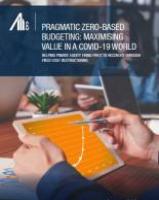Pragmatic Zero-Based Budgeting: Maximising Value in a COVID-19 World
To embed a cost-conscious culture, many companies have embraced Zero-Based Budgeting (‘ZBB’). As a result, resetting fixed costs during the annual business planning cycle has become an important value creation lever to improve EBITDA and re-invest some of savings as fuel for growth.
However, the disruptive shock of COVID-19 and uncertainty about the resulting economic climate is unprecedented and is setting new thresholds for both business supply/demand and the underlying cost base, which over the medium to long-term, will become business as usual. The ability to align fixed costs to this ‘new normal’ will be crucial for PE-backed businesses to survive and recover.
Is it time to rethink your ZBB approach?
The traditional ZBB approach followed by many large companies is often a complicated, time consuming and heavily finance-oriented budgeting exercise that can fail to change behaviours, engage workforce and deliver sustainable financial outcomes
In such cases, a Pragmatic-ZBB toolkit provides a way forward to identify decisive measures with a strong focus on pace and ROI.

In our latest report, we review traditional approaches to ZBB techniques and then outline how the adoption of a Pragmatic-ZBB approach, tailored to a Private Equity’s needs, can deliver significantly faster results with double digit Return on Investment ('ROI') while creating resilience against further shocks.
The authors, Naresh Kumar, Mark Bennett and Bob Rajan, have served in senior interim roles and share proven operating principles and expertise in delivering sustainable cost savings.
If you are interested in discussing how we could help you through a Pragmatic-ZBB implementation, please get in touch with one of our experts.


